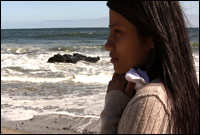Six months ago, when I agreed to travel to Nepal to work on a documentary about refugees from Bhutan, I truly had no idea what I was getting myself into. I had recently escaped the imaginary shackles of life in Los Angeles and had entered into what I was optimistically referring to as a "state of listening."
I was doing my best to accept all opportunities that came my way, whether they made sense at the time or not. I hoped that if I kept saying "yes" with faith and trust then, at the very least, I would learn a lesson or two along the way. As it turned out, in saying "yes" to this project to document the transformation of lives of Bhutanese refugees, I received not only a lifetime's worth of lessons but a transformation of my own.
When I received the invitation to work on this film, I had never even heard of Bhutan. I was completely unaware of its reputation as an idyllic Buddhist utopia, the elusive "Shangri-la," a country that – in defiance of the global status quo – measures the success of its economy with the metric of Gross National Happiness rather than Gross National Product.
I also learned about the rarely mentioned group of Bhutanese refugees living in camps in southeastern Nepal, who would be the subject of our documentary.
The refugee story I was suddenly submerged in had, amazingly, never found its way into my world history books, newspapers or magazines. Filming interviews and collecting stories from refugee camp residents and community leaders, we heard stories of oppression, racism, imprisonment and exile.
Cameras in hand, and inspiration in our hearts, producer Adam Fish and I dove in.

In a meeting on our first day at the IOM Sub-office in Damak, I was shocked to learn that hundreds of Bhutanese refugees were in the process of resettling in the state of New Hampshire, less than 30 minutes from where I was born and grew up, and where my family still lives. In an instant, a project that I had expected to be limited to a 10-day stint in Nepal shooting a TV documentary, wove itself into a web of relationships that reached beyond my camera's frame.
A few days later, as we were making our way through the villages and shooting hours of footage of the camps, Ann Strandoo, IOM's Head of Cultural Orientation in Damak, made a bold prediction: "These people are going to change your life," she told me with a smile. "You are going to go home, get your community together, gather clothes and blankets for them," she said, as if telling my fortune. Then she repeated, "These people are going to change your life."
As I sat across from Ann in the air-conditioned frost of her IOM office, it was tough to doubt the confidence in her voice. That glimmer in her eye told me that she knew what she was talking about. Regardless, I was still finding it a little difficult to imagine Bhutanese refugees actually living in Manchester, New Hampshire. Was I really supposed to believe that they would in fact be back there on the Atlantic coast this winter, living next to my friends and family, throwing snowballs and raking leaves in provincial, folksy, Caucasian New England?
This vision contrasted starkly with the oppressive daily realities of the monsoon-shredded refugee camps. It seemed inconceivable, but despite the shortcomings of my imagination, the resettlement was already underway. Many refugees had already found their new homes in my old home and many more were en route.
I knew that the transition to the US would be turbulent, even for the openhearted, optimistic, brilliant Bhutanese. I was increasingly inspired to serve as a familiar face back in New Hampshire for my new friends as they built their lives and homes - once more - in a strange new world. And so, the mission that drew me to Nepal was to follow me back home again.
I suffered the standard culture shock symptoms when I arrived back in New Hampshire - traffic was organized - the streets were clean - cars outnumbered livestock. I was disoriented, and I had only been transplanted to Damak for ten days. I couldn't begin to guess what was whirling through the upside-down world of the relocated Bhutanese, who were now my new neighbors.
I learned that every day is a new series of tests. Instead of patching up leaks in their straw roofs, they are negotiating ink cartridges for their second hand printers. Every day is filled with discoveries in this foreign place they are admirably navigating with grace and strength.
My life has been deeply touched by these people. Their steadfastness, in both enduring relentless rains in the refugee camps as well as negotiating the complexities of everything new, from seatbelts to stovetops in Manchester, has been a true inspiration. With so many reasons to give up and say ‘no,' they have chosen to move forward time and time again with ever enduring smiles on their faces.
As winter approaches, I realize that Ann may be a fortune-teller after all. Her prediction back in Damak was right. I am getting my community in New Hampshire together, gathering extra clothes and blankets so that my new dear friends may stay warm as cooler months approach.
Recently, I took one of the families to the Atlantic Ocean where they saw the sea for the first time. As I watched them, standing on the edge of a continent, and standing on the edge of a new life in a new home, I reflected on their courageous journey and how far all of us have come by saying ‘yes' to life.
To contact Ms. Bramante write to: DoriaBramante@gmail.com